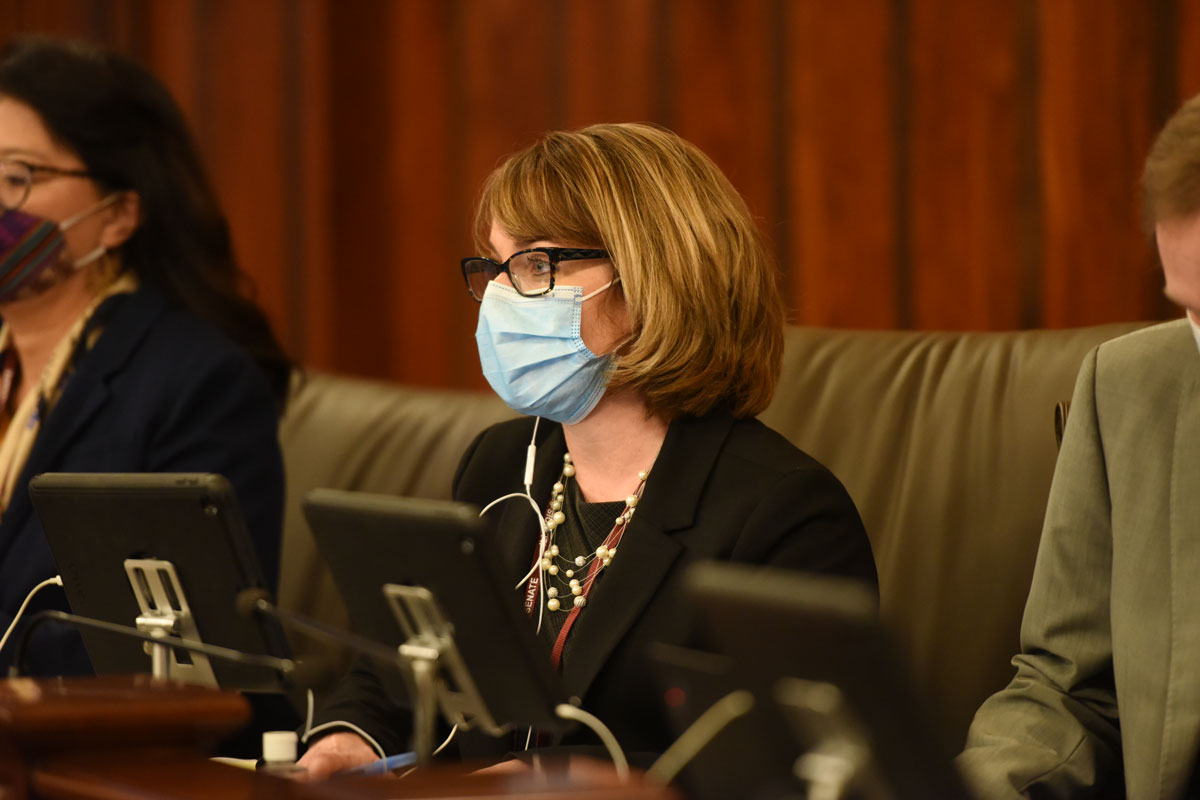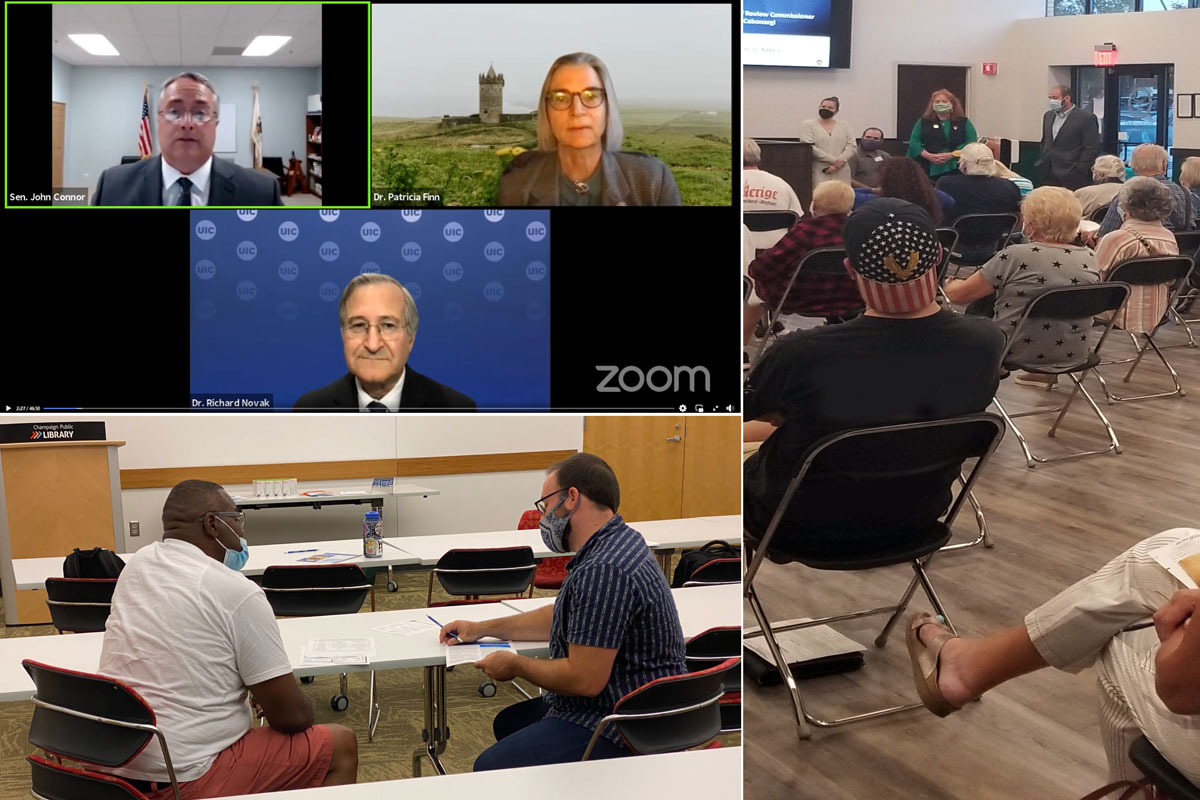- Details
- Category: Senator Laura Murphy News
 DES PLAINES – As businesses work to bounce back from pandemic-related losses, State Senator Laura Murphy (D-Des Plaines) is encouraging them to take advantage of Back to Business grants for assistance.
DES PLAINES – As businesses work to bounce back from pandemic-related losses, State Senator Laura Murphy (D-Des Plaines) is encouraging them to take advantage of Back to Business grants for assistance.
The B2B program allocates $250 million in American Rescue Plan Act dollars for small businesses experiencing COVID-19 losses, and grants will continue to be awarded on a rolling basis.
“A number of local businesses have already received funding to help them keep their doors open while keeping their employees and the community safe,” Murphy said. “Assistance is still available – apply today.”
Eligible businesses are encouraged to apply by visiting the DCEO website. To help restore operational losses incurred during the pandemic, the B2B program will provide grants ranging in size from $5,000 to $150,000, commensurate with losses experienced. The administration will continue to accept applications for B2B grants through Oct. 13.
Further, to highlight and support local businesses in the district, Murphy launched a small business tour series and requests entrepreneurs to invite her to visit their businesses. She hopes to meet a variety of business owners and workers, including retail shops, manufacturing businesses and businesses in the service industry – from salons to optometrists.
“Our small businesses have overcome unimaginable challenges over the past year and a half. Although we’re approaching recovery, many business owners are still in need of support,” Murphy said. “I look forward to touring our community’s businesses, hearing their stories and helping promote their work.”
Business owners can submit their information at senatorlauramurphy.com to be considered for a tour. Once an application is received, a member of Murphy’s team will reach out with additional details.
Murphy urges residents to reach out to her office at 847-718-1110 or visit her website with questions and concerns.
- Details
- Category: Senator Meg Loughran Cappel News
 PLAINFIELD – To celebrate and honor those who served our country, State Senator Meg Loughran Cappel (D-Shorewood), State Representative Natalie Manley (D-Joliet) and Will County Executive Jennifer Bertino-Tarrant will partner with local stakeholders to host a veteran breakfast event ahead of the Veterans Day holiday.
PLAINFIELD – To celebrate and honor those who served our country, State Senator Meg Loughran Cappel (D-Shorewood), State Representative Natalie Manley (D-Joliet) and Will County Executive Jennifer Bertino-Tarrant will partner with local stakeholders to host a veteran breakfast event ahead of the Veterans Day holiday.
“Those who put their lives on hold in service of something greater than themselves deserve our thanks and praise,” Loughran Cappel said. “This event serves as a small token of appreciation for our local heroes, helps them connect with others who have served, and gives them an opportunity to learn more about different government programs and services that are available to assist them.”
Read more: Area lawmakers to host Veteran Appreciation breakfast
- Details
- Category: Senator Patricia Van Pelt News
 CHICAGO – The first wave of Back to Business grants was awarded, with over half a million dollars going to businesses in the 5th District, State Senator Patricia Van Pelt (D-Chicago) announced.
CHICAGO – The first wave of Back to Business grants was awarded, with over half a million dollars going to businesses in the 5th District, State Senator Patricia Van Pelt (D-Chicago) announced.
Through the B2B program, $250 million in American Rescue Plan Act dollars are set aside for small businesses experiencing COVID-19 losses. The first wave granted more than $24 million to small businesses across the state. Eligible businesses can apply for the second wave by Oct. 13.
“I am happy that after experiencing so much loss, businesses will continue to have access to financial aid,” Van Pelt said. “I hope that all businesses will take the opportunity to apply for these grants, which can help their businesses get back to business as usual.”
So far, more than half of the grants have gone to minority-owned businesses. On average, recipients of B2B grants experienced revenue declines of 39% last year.
Businesses located within Disproportionately Impacted Areas will be prioritized, with more than $100 million in funds set aside for these zip codes. Businesses with revenues of $20 million or less in 2019 and a reduction in revenue in 2020 due to COVID-19 are eligible. The threshold is $35 million or less for hotels.
“I am happy to see that several Black and Brown businesses have benefitted from the first wave of B2B grants, including over $500,000 for businesses in the 5th District,” Van Pelt said. “I look forward the second wave of grants, and for more business to get much needed relief.”
Businesses may receive grants between the ranges of $5,000 to $150,000 to assist with losses experienced. Eligible businesses are encouraged to apply through Oct. 13, 2021 by visiting DCEO’s website.
- Details
- Category: Senator Doris Turner News
 CARLINVILLE – On Thursday, State Senator Doris Turner (D-Springfield) visited MJM Electric Cooperative in Carlinville. MJM provides power to members in Macoupin, Jersey, and Montgomery Counties.
CARLINVILLE – On Thursday, State Senator Doris Turner (D-Springfield) visited MJM Electric Cooperative in Carlinville. MJM provides power to members in Macoupin, Jersey, and Montgomery Counties.
The new facility is equipped with state-of-the-art technology that can tell the dispatchers at headquarters each utility pole position and its current status in the middle of a significant weather event. If a pole were to fall due to strong winds, the dispatcher can see the update in real time and send a lineman out to fix the pole.
Senator Turner also toured the newly completed community room, equipped with a full kitchen, available for rent to any community organization.
“I enjoyed meeting with Laura and everyone at MJM,” Turner said. “The smartboard technology employed at MJM will cut outage response times dramatically.”
Turner plans additional tours of businesses and facilities throughout the district she represents. Interested organizations can contact her office at 217-782-0228 or by email at www.senatordoristurner.com.
Photo: State Senator Doris Turner (D-Springfield) poses outside with MJM Electric Cooperative CEO, Laura Cutler, Thursday, Sept. 30, 2021.
- Details
- Category: Majority Report
New pay equity partnership will uplift working women in Illinois
SPRINGFIELD – A $350,000 partnership between the Illinois Department of Labor and Women Employed will help low-income women across the state learn about pay equity and transparency laws, drawing praise from the Illinois Senate Women’s Caucus.
“This partnership will uplift working women and create a support network in every community across Illinois,” said State Senator Ann Gillespie (D-Arlington Heights), co-chair of the Senate Women’s Caucus. “I am proud of the work Women Employed are doing to tear down barriers to economic parity.”
Labor Chair Holmes announces improved security for state's unemployment insurance benefit system
AURORA – The Illinois Department of Employment Security and Illinois Department of Innovation and Technology have launched a new identity verification and multi-factor authentication solution for IDES’ unemployment insurance benefits system, according to Assistant Majority Leader and Senate Labor Committee Chair Linda Holmes (D-Aurora).
“During the course of the pandemic, IDES experienced problems with security for the accounts and personal information of unemployed Illinoisans filing claims. States across the nation experienced fraud as unemployment hit unprecedented levels,” Holmes said. “This new ILogin system will strengthen existing protections for users and help the agency find and deal with fraudulent activity attempts.”
Senate Redistricting Committee to Hold Public Hearings on Congressional and Judicial Subcircuit Maps
Public encouraged to weigh in as General Assembly considers new boundaries
SPRINGFIELD – The Senate Redistricting Committee will hold a series of public hearings to gather input on new Congressional and judicial subcircuit boundaries following information recently released by the U.S. Census Bureau.
At least five hearings will take place as the General Assembly prepares to vote on new maps, and the public is encouraged to weigh in by providing testimony about potential changes or submitting proposed maps for the committee to consider.

In case you missed it
MEMBERS IN THE NEWS
Senator Omar Aquino, Chicago: Pritzker signs measure to limit how law enforcement works with ICE | KPVI NBC 6
Senator Cristina Castro, Elgin: Pritzker approves housing program for those at-risk of drug overdose | The Center Square
Senator Michael E. Hastings, Frankfort: Illinois becomes 1st Midwestern state to pass a law to phase out fossil fuels | Yahoo! News
Senator Elgie R. Sims, Jr., Chicago; Senator Celina Villanueva, Chicago: Gov. Pritzker Announces First $24 Million In Back To Business Grants To Support Small Businesses | Effingham Radio
The Majority Report is now available in an audio version
Now you can get your weekly Senate Majority Report on the go. If you're pressed for time, listen in for this week's news highlights in podcast form here.
Copyright 2021 - Illinois Senate Democratic Caucus - All Rights Reserved
- Details
- Category: Member News
 MORTON GROVE – State Senators Ram Villivalam (D-Chicago) and Laura Fine (D-Glenview) joined administrators, staff and other officials on Monday for a groundbreaking ceremony at the Julia S. Molloy Education Center in Morton Grove.
MORTON GROVE – State Senators Ram Villivalam (D-Chicago) and Laura Fine (D-Glenview) joined administrators, staff and other officials on Monday for a groundbreaking ceremony at the Julia S. Molloy Education Center in Morton Grove.
“This expansion will provide students throughout our community with a quality learning environment tailored to their needs,” Villivalam said. “I am proud to stand with our youth, parents and educators that serve our community today.”
"The Molloy School is life changing for the most vulnerable students in our district," Senator Fine said. "This expansion will allow the school to continue its incredible work of educating our children.”
Read more: Villivalam, Fine break ground at Molloy Education Center
- Details
- Category: Senator Christopher Belt News
 EAST ST. LOUIS – State Senator Christopher Belt (D-Swansea) is encouraging local businesses to apply for the second wave of Back to Business grants, which closes on Oct. 13.
EAST ST. LOUIS – State Senator Christopher Belt (D-Swansea) is encouraging local businesses to apply for the second wave of Back to Business grants, which closes on Oct. 13.
“Throughout the pandemic, our small businesses have remained assets to the Metro East community, despite all the struggles they faced,” Belt said. “It’s important for us all to be gracious to those who showed up, and for those businesses to get the aid they deserve from our government.”
Read more: Belt encourages businesses in the Metro East to apply for B2B
- Details
- Category: Member News

Wednesday evening was busy for Illinois Senate Democratic Senators across the state as five of them held events to help provide resources to their communities.
State Senators Ann Gillespie (D-Arlington Heights) and Laura Murphy (D-Des Plaines) co-sponsored a Property Tax Assessment Appeal workshop alongside experts to help inform residents on the property tax appeal process and how to lower their property tax bills.
“I’m continuously working on real, long-term solutions to the high property tax rates burdening Illinois families,” Murphy said. “I was glad to host this property tax appeal workshop to help people file appeals to their property tax bills.”
Read more: Residents learning how to access information and lower bills at senator events
More Articles …
Page 403 of 769



